|
|
|
Sort Order |
|
|
|
Items / Page
|
|
|
|
|
|
|
| Srl | Item |
| 1 |
ID:
172881


|
|
|
|
|
| Summary/Abstract |
Faith in the resilience of the US Constitution prompts many observers to discount evidence of a deepening crisis of governance in our day. A long history of success in navigating tough times and adapting to new circumstances instills confidence that the fundamentals of the system are sound and the institutions self-correcting. The aim of this article is to push assessments of this sort beyond the usual nod to great crises surmounted in the past and to identify institutional adaptation as a developmental problem worthy of study in its own right. To that end, we call attention to dynamics of adjustment that have played out over the long haul. Our historical-structural approach points to the “bounded resilience” of previous adaptations and to dynamics of reordering conditioned on the operation of other governance outside the Constitution’s formal written arrangements. We look to the successive overthrow of these other incongruous elements and to the serial incorporation of previously excluded groups to posit increasing stress on constitutional forms and greater reliance on principles for support of new institutional arrangements. Following these developments into the present, we find principles losing traction, now seemingly unable to foster new rules in support of agreeable governing arrangements. Our analysis generates a set of propositions about why the difficulties of our day might be different from those of the past in ways that bear directly on resilience and adaptability going forward.
|
|
|
|
|
|
|
|
|
|
|
|
|
|
|
|
| 2 |
ID:
172886
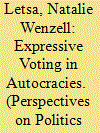

|
|
|
|
|
| Summary/Abstract |
Why do people vote in autocratic elections? Until now, most answers to this question have argued that people vote because they expect a material reward, such as patronage or a direct transfer via vote-buying, or as a way of rewarding the regime for its economic performance. I argue that citizens also vote for different non-economic, expressive reasons, such as a sense of civic duty or a desire to improve the democratic process. I present data from an original quasi-national public-opinion survey conducted in Cameroon, which shows that expressive reasons for voting can explain more variation in voting behavior than economic reasons. These different motivations challenge the implications of existing models of democratization by explaining how some of the poorest electoral autocracies have withstood decades of economic stagnation.
|
|
|
|
|
|
|
|
|
|
|
|
|
|
|
|
| 3 |
ID:
172890


|
|
|
|
|
| Summary/Abstract |
Survey research can generate knowledge that is central to the study of collective action, public opinion, and political participation. Unfortunately, many populations—from undocumented migrants to right-wing activists and oligarchs—are hidden, lack sampling frames, or are otherwise hard to survey. An approach to hard-to-survey populations commonly taken by researchers in other disciplines is largely missing from the toolbox of political science methods: respondent-driven sampling (RDS). By leveraging relations of trust, RDS accesses hard-to-survey populations; it also promotes representativeness, systematizes data collection, and, notably, supports population inference. In approximating probability sampling, RDS makes strong assumptions. Yet if strengthened by an integrative multimethod research design, it can shed light on otherwise concealed—and critical—political preferences and behaviors among many populations of interest. Through describing one of the first applications of RDS in political science, this article provides empirically grounded guidance via a study of activist refugees from Syria. Refugees are prototypical hard-to-survey populations, and mobilized ones are even more so; yet the study demonstrates that RDS can provide a systematic and representative account of a vulnerable population engaged in major political phenomena.
|
|
|
|
|
|
|
|
|
|
|
|
|
|
|
|
| 4 |
ID:
172889


|
|
|
|
|
| Summary/Abstract |
Contemporary writing on North African borderlands invokes the idea of a general, unregulated porosity through which small-scale informal traders of food or textiles move alongside drug smugglers and terrorists. I challenge that conception, demonstrating that the vast majority of smuggling activity is in fact highly regulated through a dense network of informal institutions that determine the costs, quantity, and types of goods that can pass through certain nodes, typically segmenting licit from illicit goods.
While informal, the institutions regulating this trade are largely impersonal and contain third-party enforcement, hence providing a direct empirical challenge to common characterisations of informal institutions in political science. I argue that revisiting the characteristics associated with informal institutions, and understanding them as contingent on their political environment, can provide a new starting point for studying institutions, the politics of informality, state capacity, and the regulation of illegal economies.
|
|
|
|
|
|
|
|
|
|
|
|
|
|
|
|
| 5 |
ID:
172885
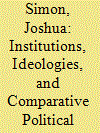

|
|
|
|
|
| Summary/Abstract |
The growing prominence of comparative political theory has inspired extensive and fruitful methodological reflection, raising important questions about the procedures that political theorists should apply when they select texts for study, interpret their passages, and assess their arguments. But, notably, comparative political theorists have mainly rejected the comparative methods used in the subfield of comparative politics, because they argue that applying the comparative method would compromise both the interpretive and the critical projects that comparative political theory should pursue. In this article, I describe a comparative approach for the study of political ideas that offers unique insight into how the intellectual and institutional contexts that political thinkers occupy influence their ideas. By systematically describing how political thinking varies across time and over space in relation to the contexts within which political thinkers live and work, the comparative method can serve as the foundation for both deconstructive critiques, which reveal the partial interests that political ideas presented as universally advantageous actually serve, and reconstructive critiques, which identify particular thinkers or traditions of political thought that, because of the contexts in which they developed, offer compelling critical perspectives on existing political institutions.
|
|
|
|
|
|
|
|
|
|
|
|
|
|
|
|
| 6 |
ID:
172888


|
|
|
|
|
| Summary/Abstract |
I offer a new perspective on the history of American democratization, tracing the evolution of conflict over black suffrage from the disenfranchisements of the early Republic to efforts to secure equal voting rights in the pre-Civil War era. I draw on case studies and new data on state politics to substantially expand our descriptive understanding of the ideological connotations of African American political rights. In contrast to existing literature, this study identifies a transformation in how positions on black suffrage polarized along party lines. It also offers a new interpretation for this racial realignment, presenting evidence that legislators responded less to the electoral consequences of black voting than to efforts of party leaders and social movements to frame its denial as necessary for national unity, a pragmatic accommodation to racist public opinion, or as complicity in slavery and a violation of republicanism. Integrating earlier periods of disenfranchisement and antislavery activism recasts standard party-driven accounts of Reconstruction-era enfranchisements as the culmination of a long process of biracial social movement organizing, enriching our understanding of how both electoral and programmatic concerns contribute to suffrage reforms and of the process by which conflict over citizenship has at times become a central cleavage in American politics.
|
|
|
|
|
|
|
|
|
|
|
|
|
|
|
|
| 7 |
ID:
172887
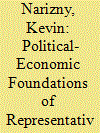

|
|
|
|
|
| Summary/Abstract |
The dominant interpretation of the Glorious Revolution portrays it as an innovative compromise that used clever institutional design to solve a coordination problem between rival elites. In contrast, I argue that it was neither innovative nor a compromise and that it was the product of structural change rather than institutional design. Following Barrington Moore, I focus on the rise of agrarian capitalism and economically autonomous elites, who, in contrast to rent-seeking elites, do not depend on favor from the state for their income. They have an interest in the creation of a political system that ensures their equal rights under the law, open access to markets, and opportunities to form broad coalitions against rent-seeking. This makes them a critical constituency for representative government. I test this argument through an analysis of patterns of allegiance for Crown and Parliament at the outset of the English Civil War and address its relevance to the Glorious Revolution.
|
|
|
|
|
|
|
|
|
|
|
|
|
|
|
|
| 8 |
ID:
172884
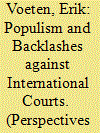

|
|
|
|
|
| Summary/Abstract |
International courts, like domestic courts, protect liberal limits on majoritarianism. This sometimes puts these courts in a position to protect the property rights of the “corrupt elites” that are targeted by populists or the civil liberties of those who are targeted in domestic populist identity politics. Moreover, populism offers an ideology to attack the authority of a court rather than just its individual rulings. An empirical examination illustrates the plausibility of this argument. A large number of backlashes against international courts arise from judgments that reinforce local populist mobilization narratives. Populist backlashes against international courts are not just about sovereignty but often follow efforts to curb domestic courts, usually for similar reasons. Yet populist backlashes do not always succeed, either because populist leaders do not follow up on their exit threats or because populism is too thin an ideology for creating successful multilateral reform coalitions.
|
|
|
|
|
|
|
|
|
|
|
|
|
|
|
|
| 9 |
ID:
172882
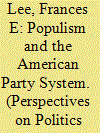

|
|
|
|
|
| Summary/Abstract |
Does populism threaten American democracy, and if so, what is the nature of that threat? In dialogue with the comparative literature on populism, this article considers the opportunity structure available to populist parties and candidates in the American political system. I argue that compared to most other democracies, the US system offers much less opportunity for organized populist parties but more opportunity for populist candidacies. Today’s major parties may also be more vulnerable to populist insurgency than at other points in US history because of (1) changes in communications technology, (2) the unpopularity of mainstream parties and party leaders, and (3) representation gaps created by an increasingly racialized party system. Although no democratic system is immune to deterioration, the US constitutional system impedes authoritarian populism, just as it obstructs party power generally. But the vulnerability of the major parties to populist insurgency poses a threat to liberal democratic norms in the United States, just as it does elsewhere.
|
|
|
|
|
|
|
|
|
|
|
|
|
|
|
|
| 10 |
ID:
172883


|
|
|
|
|
| Summary/Abstract |
How grave is the threat that populist leaders pose to democracy? To elucidate the prospects of the United States under president Donald Trump, I conduct a wide-ranging comparative analysis of populism’s regime impact in Europe and Latin America. The investigation finds that the risks have been overestimated. Populist leaders manage to suffocate democracy only when two crucial conditions coincide. First, institutional weakness, which comes in various types, creates vulnerabilities to populist power grabs. Second, even in weaker institutional settings populist leaders can only succeed with their illiberal machinations if acute yet resolvable crises or extraordinary bonanzas give them overwhelming support which enables them to override and dismantle institutional constraints to power concentration. Because none of these conditions prevail in the United States, an undemocratic involution is very unlikely. First, the federal system of checks and balances, rooted in an unusually rigid constitution, remains firm and stable. Second, President Trump encountered neither acute crises nor a huge windfall; consequently, his mass support has remained limited. Facing strong resistance from an energized opposition party and a vibrant civil society, the U.S. populist cannot destroy democracy. Instead, Trump’s transgressions of norms of civility have sparked an intense counter-mobilization that may inadvertently revitalize U.S. democracy.
|
|
|
|
|
|
|
|
|
|
|
|
|
|
|
|
| 11 |
ID:
172880


|
|
|
|
|
|
|
|